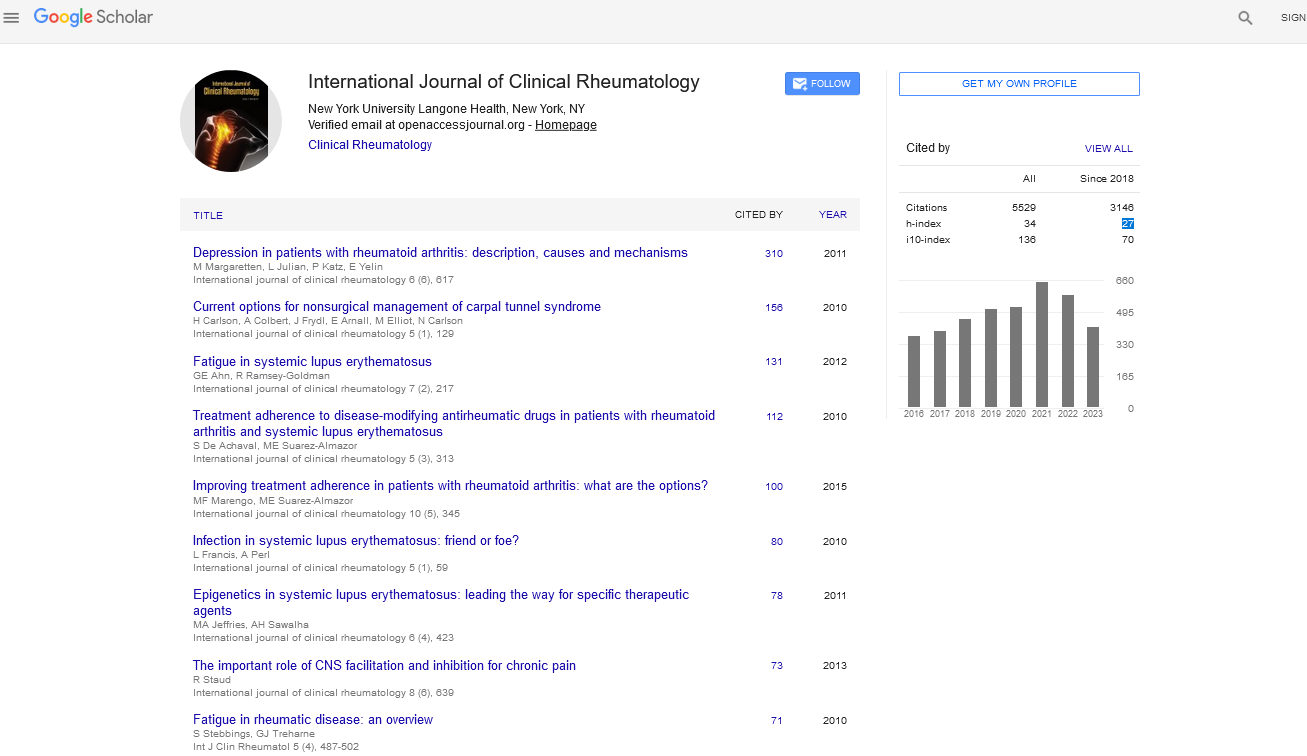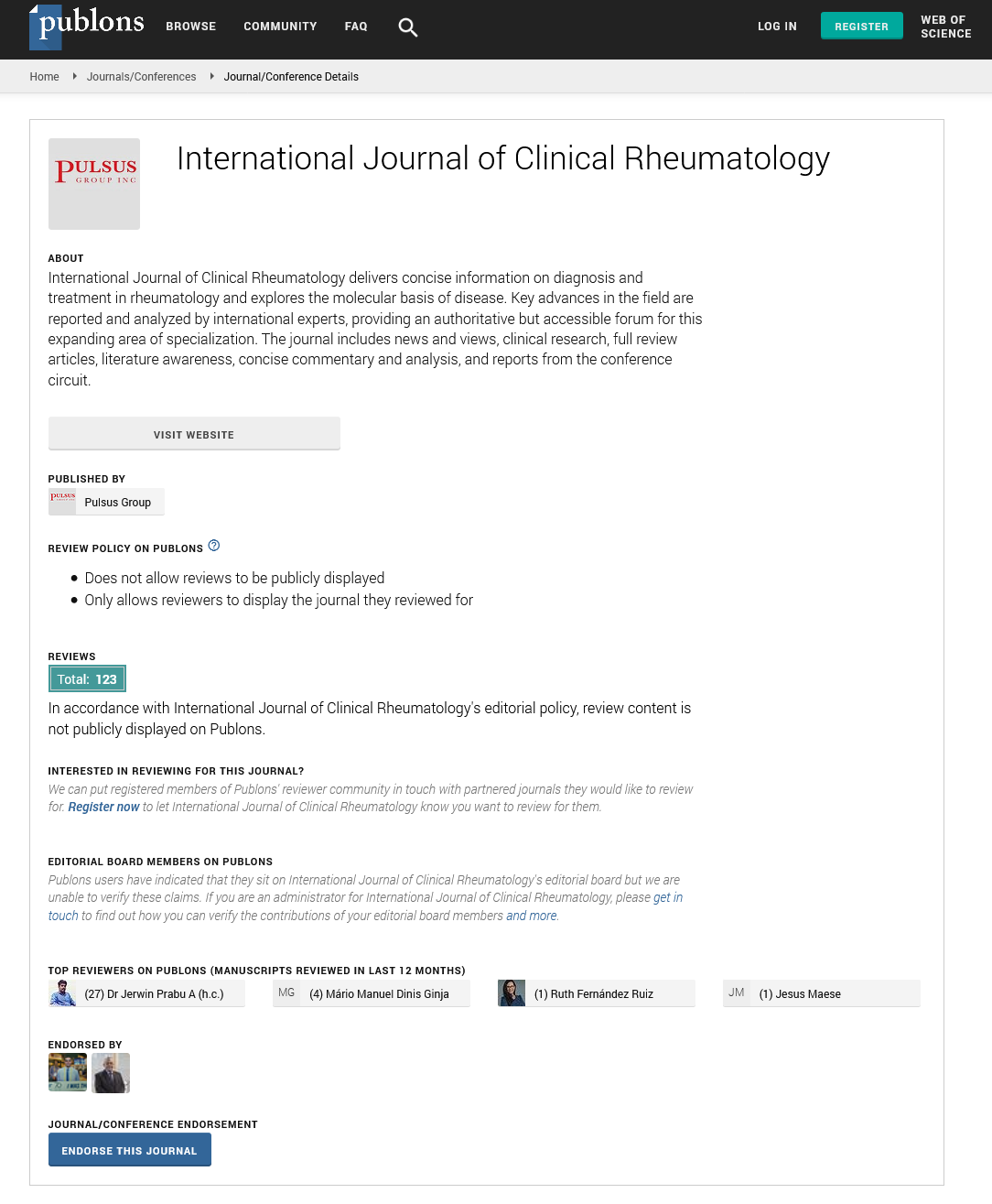Perspective - International Journal of Clinical Rheumatology (2024) Volume 19, Issue 8
Advances in the Management of Rheumatoid Arthritis
Xhiang Chen*
Department of Rheumatology of the First Hospital, Hun University of Chinese Medicine, Changansha, China
- *Corresponding Author:
- Xhiang Chen
Department of Rheumatology of the First Hospital, Hun University of Chinese Medicine, Changansha, China
E-mail: xhiang.ch@en.cn
Received: 01-Aug-2024, Manuscript No. fmijcr-24-150641; Editor assigned: 03- Aug-2024, Pre-QC No. fmijcr-24-150641 (PQ); Reviewed: 16-Aug-2024, QC No. fmijcr-24-150641; Revised: 22-Aug- 2024, Manuscript No. fmijcr-24-150641 (R); Published: 29-Aug-2024, DOI: 10.37532/1758-4272.2024.19(8).208-211
Abstract
Rheumatoid arthritis (RA) is a chronic autoimmune disorder characterized by persistent inflammation of the joints, leading to pain, disability, and reduced quality of life. With a prevalence affecting approximately 1% of the global population, RA poses significant challenges in clinical management. Recent advances in the understanding of RA's pathophysiology have led to improved diagnostic criteria and therapeutic options. This article reviews the latest developments in RA management, emphasizing early intervention, novel therapies, personalized medicine, and a multidisciplinary approach to care.
Introduction
Rheumatoid arthritis is a complex autoimmune disease that primarily affects the synovial joints but can also have systemic implications. The pathophysiology of RA involves a combination of genetic, environmental, and immunological factors that lead to the activation of the immune system and subsequent joint inflammation. The disease often manifests in a symmetrical pattern, affecting multiple joints, and can result in significant morbidity if not managed effectively.
Historically, management strategies for RA focused on conventional disease-modifying antirheumatic drugs (DMARDs), with methotrexate as the cornerstone of therapy. However, approximately 30% of patients do not respond adequately to traditional DMARDs, necessitating the development of more targeted therapies. Recent advancements have introduced biologics and targeted synthetic DMARDs that have revolutionized RA management. This article aims to provide an overview of the current state of RA management, highlighting key advances that have improved patient outcomes.
Early Diagnosis and Intervention
Early diagnosis and treatment are crucial for preventing irreversible joint damage and improving long-term outcomes in RA. The 2010 ACR/EULAR classification criteria allow for the identification of RA at an earlier stage, facilitating prompt intervention. Clinicians are encouraged to consider the presence of symptoms such as morning stiffness, joint swelling, and the presence of anti-citrullinated protein antibodies (ACPAs) in patients with risk factors. Studies have shown that initiating DMARD therapy within three months of symptom onset can significantly reduce disease activity and prevent radiographic progression [1-4]. Consequently, healthcare providers are increasingly prioritizing early referral to rheumatology for patients suspected of having RA.
Advances in DMARDs
Conventional DMARDs: Methotrexate remains the first-line treatment for RA due to its efficacy in reducing disease activity and improving function. It is often used in combination with other conventional DMARDs such as sulfasalazine and leflunomide, particularly in patients who do not achieve adequate control with methotrexate alone. The use of glucocorticoids can also help bridge therapy during the initiation of DMARDs, but their long-term use should be minimized due to potential side effects.
Biologic DMARDs: The development of biologic DMARDs has transformed the landscape of RA treatment. Biologics target specific pathways involved in the inflammatory process, leading to improved disease control and reduced joint damage. Key classes of biologics include:
Tumor Necrosis Factor (TNF) Inhibitors: Drugs such as etanercept, infliximab, and adalimumab are effective in reducing inflammation by blocking the action of TNF-alpha, a key cytokine in RA. Multiple clinical trials have demonstrated that TNF inhibitors lead to significant improvements in American College of Rheumatology (ACR) response rates and health-related quality of life [5].
Interleukin-6 (IL-6) Inhibitors: Tocilizumab and sarilumab target IL-6 signaling pathways, which play a crucial role in the inflammatory process of RA. Clinical trials have shown that IL-6 inhibitors can achieve substantial reductions in disease activity scores and improve physical functioning [6].
B-cell Depleting Agents: Rituximab, an anti-CD20 monoclonal antibody, is particularly useful for patients with refractory RA. By depleting B cells, rituximab effectively reduces disease activity and can lead to remission in some patients [7].
Targeted Synthetic DMARDs
Targeted synthetic DMARDs, particularly Janus kinase (JAK) inhibitors, represent a novel class of oral medications that offer new options for RA management. Tofacitinib, baricitinib, and upadacitinib have shown substantial efficacy in clinical trials, with significant improvements in disease activity and functional outcomes [8]. These agents inhibit specific intracellular signaling pathways involved in the inflammatory response, providing an alternative mechanism to biologics.
Personalized Medicine: The future of RA management increasingly lies in personalized medicine, which tailors treatment strategies to individual patient characteristics. Advances in genomics and biomarker research have paved the way for a more nuanced understanding of how patients respond to specific therapies. For instance, genetic factors such as HLA-DRB1 alleles have been linked to susceptibility and severity of RA. Identifying these genetic markers can help predict which patients may benefit most from certain treatments. Additionally, biomarkers associated with inflammation can assist clinicians in monitoring treatment response and adjusting therapies accordingly [9]. Personalized medicine also emphasizes shared decision-making between healthcare providers and patients, allowing for tailored treatment plans that consider patient preferences, comorbidities, and lifestyle factors.
Multidisciplinary Care Approach: Effective management of RA requires a multidisciplinary approach that addresses the physical, psychological, and social aspects of the disease. Collaboration among rheumatologists, physical therapists, occupational therapists, dietitians, and mental health professionals enhances patient care and improves outcomes.
Physical and Occupational Therapy
Physical therapy is critical for maintaining joint function and preventing disability. Tailored exercise programs can help improve strength, flexibility, and overall physical fitness. Occupational therapy focuses on enabling patients to perform daily activities with minimal pain and strain on their joints, utilizing adaptive devices and ergonomic techniques [10].
Nutrition and Lifestyle Modifications
Emerging evidence suggests that diet and lifestyle play a significant role in managing RA. Certain dietary patterns, such as the Mediterranean diet, which is rich in anti-inflammatory foods, have been associated with reduced disease activity. Encouraging patients to adopt a healthy lifestyle, including regular exercise and smoking cessation, can further enhance treatment effectiveness.
Psychological Support
Given the chronic nature of RA and its impact on quality of life, psychological support is essential. Cognitive behavioral therapy (CBT) and other therapeutic approaches can help patients manage stress, anxiety, and depression, which are common among individuals with chronic illness. Mental health professionals can provide valuable support in coping with the emotional aspects of living with RA.
Patient Education and Self-Management
Patient education is a cornerstone of effective RA management. Empowering patients with knowledge about their condition, treatment options, and self-management strategies fosters better adherence to therapy and promotes active participation in their care.
Self-management strategies, such as goal setting, pain management techniques, and monitoring disease activity, can significantly improve patient outcomes. Providing resources, support groups, and access to educational materials can enhance patients’ understanding and ability to manage their condition effectively.
Conclusion
Advancements in the management of rheumatoid arthritis have fundamentally changed the treatment landscape, leading to improved patient outcomes and quality of life. Early diagnosis and intervention, the introduction of novel therapeutic agents, and the emphasis on personalized medicine are critical components of effective RA management. A multidisciplinary approach that includes physical therapy, nutritional support, and psychological care enhances overall treatment efficacy. As research continues to unravel the complexities of RA, ongoing efforts to integrate new therapies and patient-centered care will be essential in addressing the needs of individuals living with this chronic condition. The future of RA management promises further innovations and improved strategies that will empower patients and enhance their quality of life.
References
- Kato H, Nakajima M (2013) Treatments for esophageal cancer: a review. Gen Thorac Cardiovasc Surg 61: 330-335.
- Then EO, Lopez M, Saleem S, Gayam V, Sunkara T, et al. (2020) Esophageal Cancer: An Updated Surveillance Epidemiology and End Results Database Analysis. World J Oncol 11: 55-64.
- Jeffrey PD, Russo AA, Polyak K, Gibbs E, Hurwitz J, et al. (1995) Mechanism of CDK activation revealed by the structure of a cyclinA-CDK2 complex. Nature 376: 313-320.
- Pagano M (2004) Control of DNA synthesis and mitosis by the Skp2-p27-Cdk1/2 axis. Mol Cell 14: 414-416.
- Odle RI, Walker SA, Oxley D, Kidger AM, Balmanno K, et al. (2020) An mTORC1-to-CDK1 Switch Maintains Autophagy Suppression during Mitosis. Mol Cell 77: 228-240 e227.
- Tong Y, Huang Y, Zhang Y, Zeng X, Yan M, et al. (2021) DPP3/CDK1 contributes to the progression of colorectal cancer through regulating cell proliferation, cell apoptosis, and cell migration. Cell Death Dis 12: 529.
- Li L, Wang J, Hou J, Wu Z, Zhuang Y, et al. (2012) Cdk1 interplays with Oct4 to repress differentiation of embryonic stem cells into trophectoderm. FEBS Lett 586: 4100-4107.
- Marlier Q, Jibassia F, Verteneuil S, Linden J, Kaldis P, et al. (2018) Genetic and pharmacological inhibition of Cdk1 provides neuroprotection towards ischemic neuronal death. Cell Death Discov 4: 43.
- Gregg T, Sdao SM, Dhillon RS, Rensvold JW, Lewandowski SL, et al. (2019) Obesity-dependent CDK1 signaling stimulates mitochondrial respiration at complex I in pancreatic beta-cells. J Biol Chem 294: 4656-4666.
- Smith HL, Southgate H, Tweddle DA, Curtin NJ (2020) DNA damage checkpoint kinases in cancer. Expert Rev Mol Med 22: e2.
Indexed at, Google Scholar, Crossref
Indexed at, Google Scholar, Crossref
Indexed at, Google Scholar, Crossref
Indexed at, Google Scholar, Crossref
Indexed at, Google Scholar, Crossref
Indexed at, Google Scholar, Crossref
Indexed at, Google Scholar, Crossref
Indexed at, Google Scholar, Crossref
Indexed at, Google Scholar, Crossref


